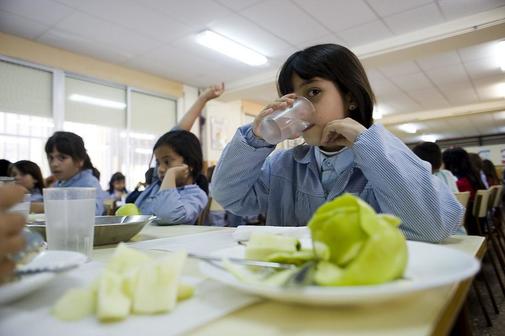- Education Do you know what your children eat in the school canteen?
- Boticaria García. The danger of mercury in fish: how much tuna can I eat per week?
The last recommendation of the Ministry of Health, through the Agency for Food Safety and Nutrition (Aesan), on the consumption in minors of fish species with high levels of mercury has caused many school menus to be reviewed to analyze whether they include them and adapt them.
The Aesan has raised from 3 to 10 years the age below which it is not advisable to consume the fish that accumulate more mercury in your body; among them, swordfish, shark, bluefin tuna or pike , since the high concentrations of that metal can affect the developing central nervous system .
Many Primary schools have paid attention to that notice and are prepared to adapt to the recommendation if necessary, according to sources.
From the Spanish Federation of Collective Restoration Companies (Feadrs) remember that their associates are "always aligned" with the guidelines of the Aesan and, therefore, "all necessary measures are being taken . "
They are contacting suppliers to review the "possible presence" of these fish varieties on the menus and, if necessary, "replace them with other options as soon as possible."
They have also recalled that "all" the raw materials used in the menus are subject to sanitary and traceability controls established by food regulations.
From the restoration company for Ausolan communities they have confirmed that they did elaborate some menus that included these species, but that "from the moment" when the recommendation was published "everything was replanned" to replace them with nutritionally equivalent ones.
Ausolan complies with recommendations of this type for "prudence" and because the company offers "a quality service, which is for people to eat from tranquility," they said.
Food security is "essential" for the company, which insists that they work with "groups that eat what is offered and are not free to go somewhere else."
In the case of Serunion, from the same collective catering sector, they are also working to adapt their menus to the new councils and are monitoring if there is a presence of these species in the menus for schoolchildren and, if so, they will change them.
From the Spanish Confederation of Associations of Parents of Students (Ceapa), one of the members of the commission of Eaters José Antonio Álvarez expresses his agreement with the decision of Health, although he believes that it should have arrived "much earlier".
He has defended the presence of fish in school menus, for their nutritional values, but it is convenient to discard species with high mercury content .
In fact, according to their data, the canteens of the centers attached to their association did not offer this fish , even before the new sanitary councils: six years ago they only serve hake, canned tuna, cod and salmon, depending on the recommendations of the experts.
For his part, the president of the National Catholic Confederation of Parents and Students' Parents (Concapa), Pedro José Caballero, points out that the species indicated by the Aesan are not, in principle, the most used for the preparation of menus .
However, they are studying what degree of implantation they have in their dining rooms so that, if they are present, they opt for others.
For Caballero the recommendation of the Aesan is "correct" , but insists on the value of fish and, in fact, they work hand in hand with the Cooperative of Shipowners of Vigo (ARVI) to study the best way to incorporate different types in schools .
The change in the school menus is a fact and, even, there are circulars sent to the parents from some schools in which it is explained that the swordfish or the bluefin tuna are being replaced by the monkfish, the croaker, the cabracho or the palometa .
According to the criteria of The Trust Project
Know more- Health
- Education
- Science and Health
Barcelona is the European city where more cocaine is consumed
LeadersThe 'extreme' that revolutionizes biomedicine from Cáceres: "In science you should never give up"
The next world "The day will come when chemotherapy is no longer necessary"

